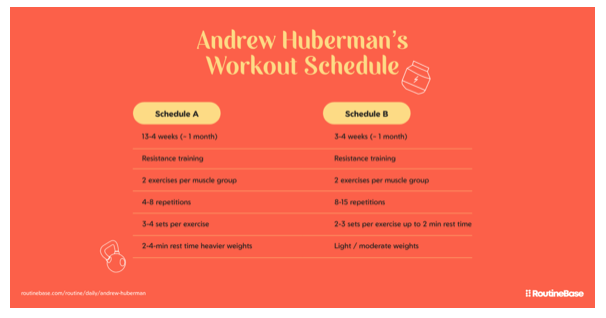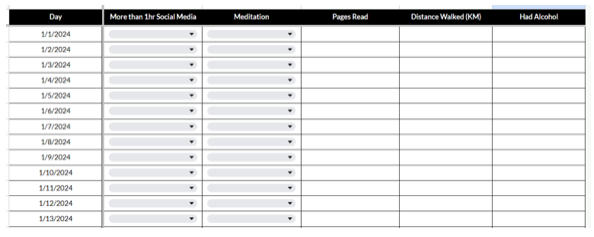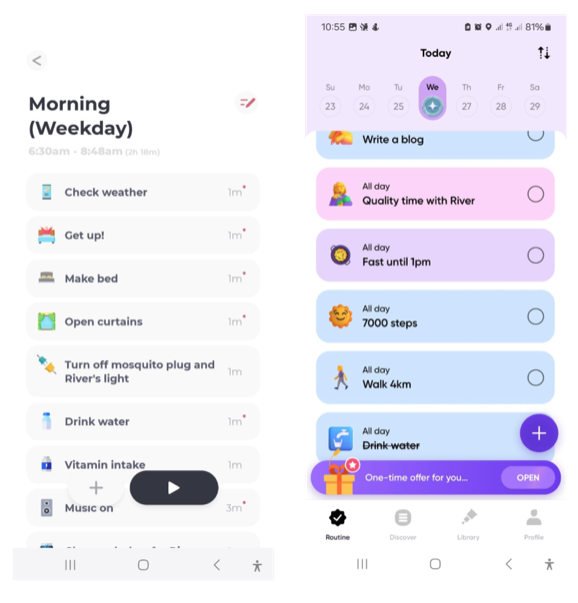
Maintaining a routine might seem mundane, but its impact on your life can be profound.
A well-established routine helps manage your day-to-day activities and fosters long-term benefits that can enhance your overall well-being, productivity, and success. For example, Andrew Huberman's routine emphasizes the importance of structure in improving daily performance and overall health.
Read on to learn more about the advantages of sticking to a routine and how it can positively influence your life.
1. Improved Mental Health
One of the most significant long-term benefits of maintaining a routine is the positive effect it has on mental health.
Having a structured daily routine provides a sense of stability and predictability, which can be particularly comforting during stressful times. Knowing what to expect each day reduces anxiety and helps you feel more in control of your life.
Routine also plays a crucial role in managing mental health conditions such as depression and anxiety. Regular activities, like exercise, meditation, or hobbies, can boost your mood and provide a sense of accomplishment.
You might want to try Andrew Huberman's workout plan:

2. Increased Productivity
Maintaining a routine allows you to maximize your productivity. Having a set schedule makes you more likely to stay focused and complete tasks efficiently.
By dedicating specific time blocks to essential activities, you can work on them without distractions, leading to higher-quality output.
In the long run, this consistent approach to productivity helps you achieve your goals more effectively.
Whether working on a professional project, personal development, or simply managing your household, a routine ensures that you make steady progress over time.
George Chasiotis, the Managing Director at Minuttia, advises that people prioritize tasks that require a lot of mental energy in the morning to make the most of their rested brains.
"Plan the work and habits that are mentally draining in the first half of the day. Otherwise, you may skip something because as the day progresses, chances are you feel more tired and more overwhelmed with all the things you have to deal with. So, you might skip them or not do them so productively."
3. Better Time Management
Time management becomes second nature when you maintain a routine.
By organizing your day around specific tasks and activities, you learn how to allocate your time wisely. It helps you avoid procrastination and ensures that you're always working toward your priorities.
Whether spending time with family, pursuing a hobby, or advancing your career, effective time management allows you to balance all aspects of your life without feeling overwhelmed.
A well-structured schedule is a blueprint for your day, allowing you to allocate specific time blocks for different tasks and activities.

4. Enhanced Physical Health
A consistent routine can greatly benefit your physical health. Regular exercise, a balanced diet, and sufficient sleep are all essential components of a healthy lifestyle, and they're much easier to maintain when they're part of your daily routine.
For example, incorporating exercise into your routine ensures that you stay active, which is vital for maintaining a healthy weight, improving cardiovascular health, and boosting your overall energy levels.
Similarly, setting aside time for meal planning and preparation helps you make healthier food choices, leading to better nutrition and long-term health benefits.
5. Stronger Personal Relationships
When you allocate specific times for family activities, socializing with friends, or connecting with your partner, you're more likely to nurture these relationships consistently. Over time, this strengthens your bonds and creates lasting memories with your loved ones.
A routine helps you manage your commitments more effectively, reducing the likelihood of stress or burnout that can strain relationships. By balancing your work and personal life, you create space for meaningful interactions and foster a supportive environment where relationships can thrive.
6. Development of Good Habits
Routines are instrumental in the development of good habits. Repeating specific actions consistently becomes ingrained in your daily life, eventually becoming habits that require less conscious effort.
For instance, if you start your day with a morning routine that includes exercise, meditation, and a healthy breakfast, these activities become automatic over time, contributing to your overall well-being.
Creating a task list helps streamline your day. Write all tasks, prioritize them, and break larger projects into smaller steps. Regularly update and check off tasks to stay organized and focused, ensuring you manage your time effectively and progress steadily.

7. Long-Term Success
Finally, one of the most compelling reasons to maintain a routine is its impact on long-term success.
Success is the result of consistent effort over time, and a routine provides the framework for that consistency. Regularly working toward your goals builds the habits, skills, and resilience needed to achieve lasting success.
Whether striving for career advancement, personal growth, or any other long-term objective, maintaining a routine ensures you stay on track. It helps you navigate challenges, stay motivated, and make continuous progress.
Conclusion
The long-term benefits of maintaining a routine are numerous and far-reaching. A well-structured routine can enhance every aspect of your life, from improved mental and physical health to increased productivity and stronger relationships.
Whether you're looking to improve your well-being or achieve ambitious goals, routine can help you get there.
FAQ
1. How can I adapt my routine if my daily schedule changes frequently?
Adapt your routine by creating a flexible framework. Build in buffer times and adjust your tasks based on priorities. Use a task list to stay organized despite changes.
2. What tools or apps can help me stick to my routine?
Consider using task management apps like Todoist or Asana, calendar apps like Google Calendar, and habit-tracking apps like Habitica or Streaks to help you stay on track.
3. How can I ensure my routine remains effective over time?
Review and adjust your routine regularly based on your goals, feedback, and any new challenges. Continuously monitor your progress and make necessary changes to keep your routine adequate and relevant.
